Thanks very much for taking time out, Becky, to do this email interview for www.endeacott.com, it’s much appreciated.
So, to start with, please tell us about yourself, such as where you’re from, where you live, your domestics, and so on.
I was an army child until I was seven when my parents divorced. I then lived briefly in Harrogate before spending seven years in Bradford then back to Harrogate – two places so close and yet worlds apart. I went to eleven schools in total. After secondary school I spent a year sofa surfing and living in overcrowded accommodation – wild parties; three, four, five, six of us sleeping in a self-contained flat. I have been in Leeds since 1998 when I moved over with my son to continue with university studies. As a single parent I was shuffled around student accommodation until I finally landed a Housing Association flat in Roundhay. Then I met my husband and, thanks to a deposit he had saved in his previous career, we bought a house in Alwoodley in Leeds where the three of us are very happy. It still feels uncomfortable to say that we are settled in suburbia after such a nomadic start and impoverished teenage/young adult life but I know how privileged I am.
What do you class yourself as, a poet, a writer, a performance poet even?
All of the above and add novelist and creative writing facilitator into the mix. I know the latter sounds a bit pretentious but it does sum up my non-didactic approach to the workshops I lead. It also makes people laugh because it rhymes with terminator.
How did you get in to writing?
 How I came to love writing was no different from many writers. As a child, I wrote at home for fun and still have text books full of illustrated stories and poems. My parents read to me and my dad told good oral stories too. Earlier in life, I had inspiring English teachers – Mr Oakley from Wellington Middle in Bradford in particular who believed in the power of narrative and was unfailingly encouraging. As a teenager I was incredibly shy and unhappy and wrote awful but passionate poetry – it stuns me how the young writers I work with now are so much more skilled and nuanced in their writing than I was at that age. Still, writing allowed me to make sense of the world around me and express myself at a time when what I said out loud was devalued and criticised. I honestly believe it saved my life.
How I came to love writing was no different from many writers. As a child, I wrote at home for fun and still have text books full of illustrated stories and poems. My parents read to me and my dad told good oral stories too. Earlier in life, I had inspiring English teachers – Mr Oakley from Wellington Middle in Bradford in particular who believed in the power of narrative and was unfailingly encouraging. As a teenager I was incredibly shy and unhappy and wrote awful but passionate poetry – it stuns me how the young writers I work with now are so much more skilled and nuanced in their writing than I was at that age. Still, writing allowed me to make sense of the world around me and express myself at a time when what I said out loud was devalued and criticised. I honestly believe it saved my life.
When I was a bit older, my mum was friends with a teacher who was a Head of English; he thought I had talent and gave me written feedback on some of my poetry. Looking back, I’m not sure whether he genuinely rated my work or simply wanted to nurture my evident desire to write but I’m grateful.
And tell us about your writing career so far (publications, credits, appearances, awards etc etc). How can people obtain your work?
I’ve had pieces in Mslexia, New Walk and Envoi, online at Well Versed, Berfrois and Voice In Journal and in anthologies published by Bloodaxe, Grist, Five Leaves and online. I was resident poet for Morley Literature Festival in 2013 and have had pieces commissioned by I-move, The Hepworth Gallery, The Rotunda Museum and Grassington Festival. Competition successes include first prize for The Speakeasy Open, second prize in the Ilkley Literature Open Mic, runner up in the Yorkshire Open and shortlist for Fish Short Story Prize.
My first, motherhood-themed, pamphlet Echolocation is coming out with Mother’s Milk in early 2016 and a first collection will be published by Cinnamon in November 2016. Two of my poems have been made into films by Pru Fowler and are doing the rounds at film festivals this season. Watch out for details on my bi-monthly blog http://beckycherriman.com/?page_id=645
In writing, what are you most proud of?
The two things that spring to mind are completing my second novel, which took me eight years and was a feat of imaginative engineering to write, and my poem Paisley Quilt, which deals with the subject of rape within a relationship. It is a very simple poem but one people have thanked me – some women because it validates their own experiences, some men because it makes them reassess theirs. ‘It really made me think, I’ve never seen it like that before,’ one man said to me. I believe that on hearing the poem he understood that rape can be rape even within a relationship and determined never to commit it [from that day].
Do you think it is, or has been, harder for women to progress in writing or your particular area?
You only have to look at the ratio of male: female performance poets at festivals and in the review sections of papers and magazines to know the answer to this. Most published reviewers are male and they tend to review more books by men even though 2/3 of readers are women.
But it’s not just women – people with disabilities; people from ethnic minorities, from outside London and from working class backgrounds are unequally represented too. Kate Fox has done a lot to raise awareness of this already and things are beginning to shift slowly.
Positive discrimination goes some way to redress the situation but there is still a long way to go and some groups aren’t considered. I think it is odd that single parents are not seen as a disadvantaged group – they tend to have a lot more time and money pressures on them and are more isolated than many people, which means they are able to make fewer contacts that are so essential to working in this world. They are also demonised by the media.
Are you making a living from your writing?
I make a little from my own writing and performances but most of what I earn is from workshops, although I hope this will become more equally balanced in the future.
I never considered writing as a realistic career, after all everyone knows you can’t make a living from it! When I left university in 2002 a friend told me about a community arts course she was taking to learn how to run arts workshops with vulnerable groups. ‘You could do it with writing,’ she said and something clicked. I’d never fancied teaching formally but this was different; I could work with words to help people unlock their own creativity and improve their confidence and self-esteem. It turned out my workshops even made people happier. As a job, it’s enough to get by but hardly a professional wage – sadly since I started working in this job twelve and a half years ago, fees have fallen in real terms, partly because a lot more external admin and ‘products’ are expected for the money and partly because fees have remained stagnant or even fallen. I’ve noticed a marked change since the government stopped the Arts Council from recommending minimum fees. It’s lucky I love what I do.
As a writer, do you have a regimented routine for writing and do you have a set workplace?
With regards to fiction, I like to work on my novel for an hour or more first thing in the morning – before checking emails or being distracted by Facebook or work calls. Then, if I’m not too busy with workshops or performances, I have a day in the week that is mainly set aside for writing. I’d like to manage more but don’t always achieve this due to work and family pressures. In the spirit of Woolf, I now actually have a writing room at home – I refuse to call it an office even though I do all my other work in there. It is such a luxury and has made me much more productive (trying to work in the room while your child watches telly isn’t easy).
As for poetry, I write anywhere that I can snatch the time – on buses, trains, in bed, in cafes. The Leeds Library is a great place to write as is Blank Page Industries, a writing space organised by Andy Armitage on the Leeds Waterfront. I get to both as often as I can.
Any moments on this ‘journey’ which you regard as a Turning Point?
On a small scale, every time I finish a piece or someone says something I’ve written or performed has affected them. On a larger scale, finding out Cinnamon Press were going to publish my collection. I had been writing seriously for such a long time and I felt like I would be at a dead end if they didn’t publish. I went into the meeting with Jan on this beautiful Wales retreat worried I would cry if she said they wouldn’t publish. Instead I cried when she said they would. In reality it wouldn’t have been a dead end and I would never have given up – I’m too bloody stubborn – but it came at the right time.
Favourite films, music, books, television programmes? Hobbies, pastimes?
I never know where to start with books as I have so many favourites – Sula by Toni Morrison, The God of Small Things, Shame by Salman Rushdie, The Poisonwood Bible by Barbara Kingsolver, Angela Carter’s The Bloody Chamber, and that’s just the fiction. Films I love include Bradford-based The Selfish Giant and Being John Malcovitch. I’m looking forward to the next series of This is England. I do like the occasional TV drama. Radio 4 is great too.
With a lot of competitive athletes in my family, exercise is in my blood and I find it essential to counteract all the computer work I do and keep me well. As a later starter, I was becoming reasonably good at running but I’ve recently had surgery so am not allowed to do that for a good few months and possibly not much after that. I’m missing it terribly but am doing a lot more of what they now call wild swimming – at the weekend I went swimming in a lake under a full moon. I also walk a lot, go to the gym, do pool swimming, cycling and bits of yoga and pilates.
Your short and long-term hopes, if any?
Long term, I hope that society becomes fairer and that people treat each other a bit better. Personally, I hope that I become a better writer. In the short term, I hope people enjoy the two poetry collections I have coming out next year and that an agent is interested in taking on my novel. I also hope that Jeremy Corbyn wins the labour leadership contest.
Back to writing: are you ‘self-taught’ or did you study some form of creative writing course and the like? Do you have an ideas ‘process’?
I studied English at Leeds Uni then was accepted onto the Yorkshire Art Circus Writer Development Programme. Some people who were on the programme with me said it was more useful than their MA in Creative Writing. It certainly helped me develop techniques and gave me professional insight into the industry.
As for an ideas process, I’d like to say I have a fail-proof method but I’m afraid my thinking style is a little chaotic. With poetry, I tend to have an idea and free-write around it soon after. Then I wait a week or so and finish a first draft. Then I edit and edit and edit over a period or weeks, months or years. With novels, I write scenes and, at some point – usually around a third of the way through – I decide how they might roughly hang together and what the end might be. Then I work towards that before again editing thoroughly. Feedback is useful after a few drafts. I’ve been lucky enough to have two mentors in my writing life – you and Caroline Davies who helped with my poetry collection.
How hard is it to keep your domestic life organized along with your writing work?
When I was a single parent it was very difficult as I was having to juggle so much with limited help. Now my son is 18 so understandably prefers to spend time with friends or on social media than with his mum. My husband is incredibly supportive. We have both sets of working hours in our diaries and I schedule work I can do at home for when he is at work or in bed – I’m an early riser.
What if anything (!) do you find as most enjoyable about the whole writing process?
Those precious moments when I’m writing and my body goes so cold that I get goosebumps. It is as though all my energy is going into what I’m typing or scribbling on the page. Sports people call it flow.
Do you have any preference in writing literature or stage or TV?
I like writing in various genres. For me, an idea decides what form it should take and I go with it. Writing a poem is like spending a day with a good friend. Writing a novel is more like bringing up a child. Make of that what you will.
Whose work do you admire? Why?
So many people’s, especially magical realist novels by Angela Carter, Toni Morrison, Salman Rushdie and Margaret Atwood. I read a lot of poetry – Dylan Thomas, Ted Hughes and Plath are great. I’m also liking what I read by Zaffar Kunial and Gaia Holmes at the moment. David Gaffney is well worth a read for his hilarious and socially accurate flash fiction. Angela Readman’s collection of short stories Don’t Try This At Home is the best I’ve read – beautifully written in the voices of characters who come from the wrong side of the track and with a touch of magical realism thrown in. Performance-wise, Miranda July for her originality and Kate Tempest for her integrity of delivery.
Do you think you will ever retire? (I always ask this question as I can’t see a day when I’ll be ABLE to!)
I would like to retire from workshops one day. I hope by then I’ll be earning enough from my writing and performances to do so. When I retire I’m going to go to as many different workshops and classes as I can, be on the other side of the desk – I’ll learn to sing and draw and paint and dance.
What motivates you?
My desire to write. Injustice.
Any advice for ‘new’ writers or artistes or anyone considering taking the plunge?
- Make time for your writing
- Write what you are passionate about
- Challenge yourself by experimenting
- Edit, edit, edit
- Keep going by focussing on what you are doing and not on what other people have accomplished
- Remember to enjoy it
Finally, what are you working on currently and any planned projects you can tell us about? Is there anything you want to promote, or personal website or blog etc?
In addition to workshop projects, Steve Toase and I will soon begin the next phase of Haunt, a project working with people experiencing homelessness and commissioned by I-move. The anthology has now been published and will be launched in the autumn. Find out more here: https://harrogatehaunt.wordpress.com/
I’m also seeking an agent for my second novel and working on another magical realist novel.
My next project will be a poetry performance piece inspired by a historical figure from Leeds.
You can find out more about what I’m up to including release dates for my pamphlet Echolocation, and my collection Empires of Clay on my blog at my website www.beckycherriman.com
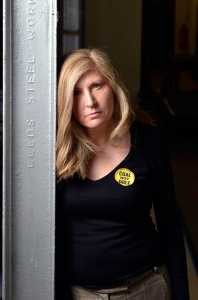
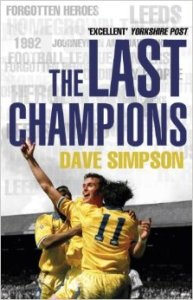
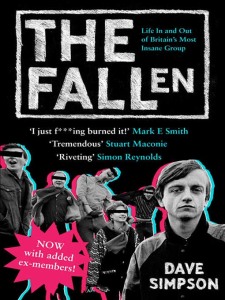
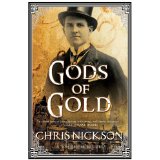 It’s been sort of an odd road for me. My first published pieces were album reviews, back in the 1970s, just after I’d moved to America. The first Kate Bush disc, and the reissue of a couple of Roy Harper LPs. That was in a local music paper in Cincinnati. I did a few more things for them, and published a couple of short stories in a tiny local magazine whose name escapes me now. I moved to Seattle in ’86, had a couple of one-act plays staged (never be writer and director; that’s a lesson I learned quickly), a couple more short stories. In ’93 I had my first music reviews published in The Rocket, also local, but very influential and filled with excellent writing. I went on to do more and more for them until they folded in 2000, by which time I was a senior writer on their masthead – I’m still very proud of that. From ’94 I did a lot of quickie unauthorised biographies. A friend got me started. I combined that with music journalism as I wrote for more and more people. It meant I could quit my job and write full-time, a big step as my son was born in ’95. I moved back to the UK in 2005, still doing plenty of music journalism, but also writing more fiction again (in the intervening years I’d amassed 7 unpublished novels, the first from when I was 20. I’m glad they never saw the light of day). Finally The Broken Token came out in 2009 and now my focus is much more on fiction. But I still keep my hand in with music and actually also write a number of press releases for artists (yes, I’m available, folks).
It’s been sort of an odd road for me. My first published pieces were album reviews, back in the 1970s, just after I’d moved to America. The first Kate Bush disc, and the reissue of a couple of Roy Harper LPs. That was in a local music paper in Cincinnati. I did a few more things for them, and published a couple of short stories in a tiny local magazine whose name escapes me now. I moved to Seattle in ’86, had a couple of one-act plays staged (never be writer and director; that’s a lesson I learned quickly), a couple more short stories. In ’93 I had my first music reviews published in The Rocket, also local, but very influential and filled with excellent writing. I went on to do more and more for them until they folded in 2000, by which time I was a senior writer on their masthead – I’m still very proud of that. From ’94 I did a lot of quickie unauthorised biographies. A friend got me started. I combined that with music journalism as I wrote for more and more people. It meant I could quit my job and write full-time, a big step as my son was born in ’95. I moved back to the UK in 2005, still doing plenty of music journalism, but also writing more fiction again (in the intervening years I’d amassed 7 unpublished novels, the first from when I was 20. I’m glad they never saw the light of day). Finally The Broken Token came out in 2009 and now my focus is much more on fiction. But I still keep my hand in with music and actually also write a number of press releases for artists (yes, I’m available, folks).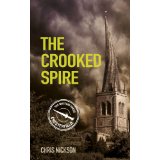 That’s almost impossible to answer, but if pinned to the ground and forced, I’d say At the Dying of the Year, the fifth in my Richard Nottingham series. One reviewer said I write ‘the fiction of loss,’ a phrase that struck me, and it’s very apt in that book. Emotionally, it drained me completely, I was a wreck when it was done. But I think that depth comes out on the page. It took me to a very dark place inside myself and I needed time to recover from it. It’s about love and loss, even though it’s a crime novel, although crime novels should always be about more than simply finding the bad guy.
That’s almost impossible to answer, but if pinned to the ground and forced, I’d say At the Dying of the Year, the fifth in my Richard Nottingham series. One reviewer said I write ‘the fiction of loss,’ a phrase that struck me, and it’s very apt in that book. Emotionally, it drained me completely, I was a wreck when it was done. But I think that depth comes out on the page. It took me to a very dark place inside myself and I needed time to recover from it. It’s about love and loss, even though it’s a crime novel, although crime novels should always be about more than simply finding the bad guy.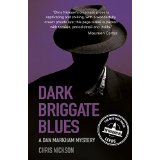 In January there Dark Briggate Blues, which is set in Leeds in the 1950s. English provincial noir featuring an enquiry agent – the term we used from private detective in those days – called Dan Markham. He’s young, loves jazz, and Leeds actually had a jazz club in those days called Studio 20, on New Briggate, where Sela Bar is today. So music is a vital part of that.
In January there Dark Briggate Blues, which is set in Leeds in the 1950s. English provincial noir featuring an enquiry agent – the term we used from private detective in those days – called Dan Markham. He’s young, loves jazz, and Leeds actually had a jazz club in those days called Studio 20, on New Briggate, where Sela Bar is today. So music is a vital part of that.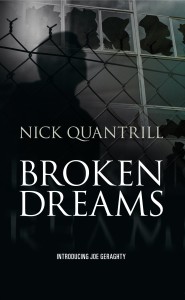 ’RE DEAD, my work follows the character Joe Geraghty, a small-time Private Investigator. Geraghty works from an office in the Old Town of Hull and over the course of three novels he’s been a device or tool for me to explore my home city. BROKEN DREAMS sees Geraghty looking for a missing person but it’s really a novel about the demise of Hull’s fishing industry and the effect of that in the present day. THE LATE GREATS sees Geraghty babysitting a reformed band, but it’s also about the nature of Hull as a city and aspects that make it unique. THE CROOKED BEAT sees Geraghty involved with a missing consignment of smuggled cigarettes, so it deals with the city’s recent regeneration as well as its courting of green technology. Together I think of them forming an overview of recent change in the city. The pleasing thing for me is that each book pushes me forward a little more and gets my writing noticed more. I’m doing more and more events (writing and author events) and have recently appeared at Crimefest, one of the UK’s major crime festivals, and Iceland Noir, my first foreign trip to talk about my work. The books have also attracted some national reviews, so fingers crossed things are heading in the right direction…
’RE DEAD, my work follows the character Joe Geraghty, a small-time Private Investigator. Geraghty works from an office in the Old Town of Hull and over the course of three novels he’s been a device or tool for me to explore my home city. BROKEN DREAMS sees Geraghty looking for a missing person but it’s really a novel about the demise of Hull’s fishing industry and the effect of that in the present day. THE LATE GREATS sees Geraghty babysitting a reformed band, but it’s also about the nature of Hull as a city and aspects that make it unique. THE CROOKED BEAT sees Geraghty involved with a missing consignment of smuggled cigarettes, so it deals with the city’s recent regeneration as well as its courting of green technology. Together I think of them forming an overview of recent change in the city. The pleasing thing for me is that each book pushes me forward a little more and gets my writing noticed more. I’m doing more and more events (writing and author events) and have recently appeared at Crimefest, one of the UK’s major crime festivals, and Iceland Noir, my first foreign trip to talk about my work. The books have also attracted some national reviews, so fingers crossed things are heading in the right direction…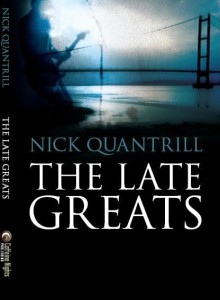 How did you commence your writing career, and are there any moments on this journey which you regard as a real Turning Point?
How did you commence your writing career, and are there any moments on this journey which you regard as a real Turning Point? 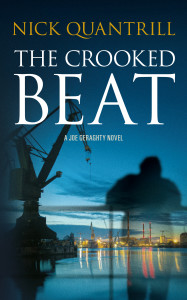 Not in the foreseeable future, but maybe one day. It still feels like I’ve got a lot to do in the crime genre. It’s what I love to read and write. I do have other ideas, though. I love what you and David Peace do with the mix of football and fiction. I can see the potential of a few Hull City-related projects. I’m not sure how much I want to write non-fiction but I have a few ideas in that direction, too. I really like Roddy Doyle’s earthy and gritty tales and have the vague notion that a story telling the life-story of Hull over the last hundred years through the eyes of a handful of families might be a good idea. Think Downtown Abbey with added fish and violence, maybe!
Not in the foreseeable future, but maybe one day. It still feels like I’ve got a lot to do in the crime genre. It’s what I love to read and write. I do have other ideas, though. I love what you and David Peace do with the mix of football and fiction. I can see the potential of a few Hull City-related projects. I’m not sure how much I want to write non-fiction but I have a few ideas in that direction, too. I really like Roddy Doyle’s earthy and gritty tales and have the vague notion that a story telling the life-story of Hull over the last hundred years through the eyes of a handful of families might be a good idea. Think Downtown Abbey with added fish and violence, maybe!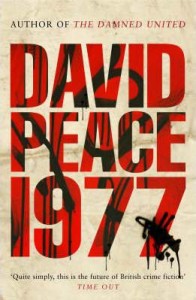 There are bits of each of the books that I like and bits of each of the books that I don’t, but I think Nineteen Seventy-seven is perhaps the published book that is closest to the imaginary one I had in my head. However, the book I’m “proudest of” is still GB84 because I believe the Miners’ Strike of 1984 / 85 is the most important and still most relevant and still most contentious moment in post-war British history.
There are bits of each of the books that I like and bits of each of the books that I don’t, but I think Nineteen Seventy-seven is perhaps the published book that is closest to the imaginary one I had in my head. However, the book I’m “proudest of” is still GB84 because I believe the Miners’ Strike of 1984 / 85 is the most important and still most relevant and still most contentious moment in post-war British history.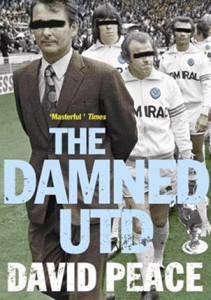 Yeah, I think you’re right, Rob. And that was why it was such a change and a relief to write about Bill Shankly. I know it sounds very dramatic, but writing about crime in the way I do can be very depressing and draining. But I think that is an inevitable part of the process, if you are going to write about the tragedy and violence of crimes (political ones as well as criminal ones).
Yeah, I think you’re right, Rob. And that was why it was such a change and a relief to write about Bill Shankly. I know it sounds very dramatic, but writing about crime in the way I do can be very depressing and draining. But I think that is an inevitable part of the process, if you are going to write about the tragedy and violence of crimes (political ones as well as criminal ones).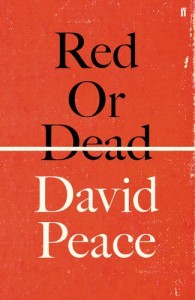 Well, the repetition has come in for a fair amount of criticism, but other people – like your good self – have been more tolerant. Thank you. However, and I think this is worth stressing, I see Red or Dead as a portrait of Bill Shankly. It’s not a photograph, in the way some people might consider a biography to be. It is a novel which I hope is a portrait of Bill Shankly; my “painting with words” of the man. And everything in the book is there to try to illuminate that portrait of Bill Shankly. And the repetition came from things Shankly said himself, and from my own research. It wasn’t just a stylistic tic on my part or an affectation, as some people have suggested. In his retirement, Shankly himself said football was like a river; it was relentless, it went on and on, and there was no stepping out of it. And I think, even as supporters, we know the truth in that and can imagine how very, very much more intense that must be for the people on “the inside”, let alone for someone who was so consumed and obsessed by the game as Bill Shankly was, day in, day out, for every day of his life. And so his words, and then the things he did, the way he lived his life, this was where the repetition came from and is then simply my attempt to show both the rituals and routines of the training and the matches, all the games through all the seasons, and also Bill Shankly’s utter commitment and dedication to both the sport and the supporters, and the sacrifices and struggles he made in order to “make the people happy”. But, of course, Lee and Angus, my editors at Faber & Faber, and other people I trust, were involved in the various drafts of the novel and made different suggestions, too.
Well, the repetition has come in for a fair amount of criticism, but other people – like your good self – have been more tolerant. Thank you. However, and I think this is worth stressing, I see Red or Dead as a portrait of Bill Shankly. It’s not a photograph, in the way some people might consider a biography to be. It is a novel which I hope is a portrait of Bill Shankly; my “painting with words” of the man. And everything in the book is there to try to illuminate that portrait of Bill Shankly. And the repetition came from things Shankly said himself, and from my own research. It wasn’t just a stylistic tic on my part or an affectation, as some people have suggested. In his retirement, Shankly himself said football was like a river; it was relentless, it went on and on, and there was no stepping out of it. And I think, even as supporters, we know the truth in that and can imagine how very, very much more intense that must be for the people on “the inside”, let alone for someone who was so consumed and obsessed by the game as Bill Shankly was, day in, day out, for every day of his life. And so his words, and then the things he did, the way he lived his life, this was where the repetition came from and is then simply my attempt to show both the rituals and routines of the training and the matches, all the games through all the seasons, and also Bill Shankly’s utter commitment and dedication to both the sport and the supporters, and the sacrifices and struggles he made in order to “make the people happy”. But, of course, Lee and Angus, my editors at Faber & Faber, and other people I trust, were involved in the various drafts of the novel and made different suggestions, too.